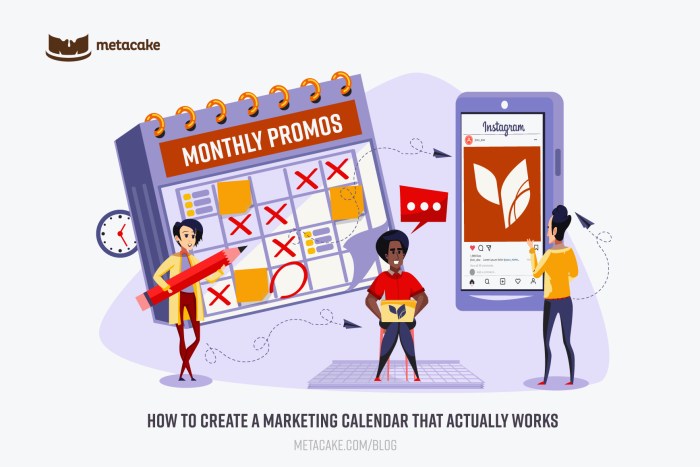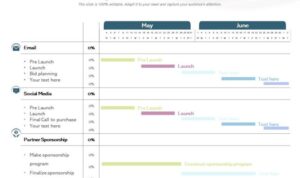Developing an Event Marketing Calendar sets the stage for this enthralling narrative, offering readers a glimpse into a story that is rich in detail with american high school hip style and brimming with originality from the outset.
When it comes to event planning, having a structured marketing calendar can make all the difference. From organizing tasks to ensuring smooth execution, this essential tool plays a vital role in the success of any event. Let’s dive into the world of event marketing calendars and discover the key components that lead to effective planning and coordination.
Importance of Event Marketing Calendar
Having a structured event marketing calendar is crucial for successful event planning because it provides a roadmap for all the tasks and activities that need to be completed leading up to the event. It helps in ensuring that everything is organized and executed efficiently and on time.
Organizing Tasks and Timelines
An event marketing calendar can help in organizing tasks and timelines effectively by clearly outlining deadlines, responsibilities, and dependencies. For example, it can highlight when promotional materials need to be designed, social media posts need to be scheduled, or when tickets need to go on sale. This level of detail ensures that no important task is overlooked or left until the last minute.
Improving Coordination Among Team Members
A well-developed event marketing calendar can improve coordination among team members by providing a centralized platform where everyone can see what needs to be done and by when. This transparency reduces the chances of miscommunication, duplication of efforts, or missing deadlines. With everyone on the same page, team members can work together more effectively towards the common goal of a successful event.
Components of an Effective Event Marketing Calendar
Creating an effective event marketing calendar involves including key elements, important dates, deadlines, milestones, and integrating promotional activities seamlessly.
Key Elements to Include:
- Event Name and Description
- Date, Time, and Location
- Target Audience
- Goals and Objectives
- Budget and Resources
- Team Responsibilities
Incorporating Important Dates:
- Mark key event dates such as start and end dates, registration deadlines, and promotional campaign launch dates.
- Include milestones like when to finalize event logistics, confirm speakers, and send out invitations.
- Add important industry-related dates that could impact your event, such as holidays or conferences.
Integrating Promotional Activities:
- Create a timeline for marketing campaigns leading up to the event, including social media promotions, email campaigns, and advertising.
- Coordinate promotional activities with key milestones in the event planning process to maximize impact.
- Allocate resources and budget for each promotional activity and track their effectiveness for future planning.
Creating a Timeline for Event Marketing: Developing An Event Marketing Calendar

When it comes to event marketing, having a well-thought-out timeline is crucial for the success of your strategies. A timeline helps you stay organized, allocate resources effectively, and ensure that all tasks are completed on time. Here’s how you can create a timeline for your event marketing activities:
Prioritizing Tasks and Allocating Time Slots
To create a timeline, start by identifying all the tasks that need to be completed before, during, and after the event. Once you have a comprehensive list, prioritize them based on their importance and deadlines. Allocate specific time slots for each task in your event marketing calendar, taking into consideration the estimated time needed to complete them.
- Start by setting deadlines for major milestones such as creating promotional materials, launching social media campaigns, or booking event venues.
- Break down larger tasks into smaller, manageable sub-tasks with their own deadlines to ensure progress is made consistently.
- Consider the dependencies between tasks and allocate time accordingly to avoid bottlenecks or delays.
- Be realistic with your time estimates and build in buffer time for unexpected delays or revisions.
Setting Realistic Deadlines and Milestones
Setting realistic deadlines and milestones is essential to ensure the smooth execution of your event marketing strategies. Here are some examples of how you can set deadlines and milestones effectively:
- Example 1: Set a deadline for sending out event invitations at least three weeks before the event date to give attendees enough time to RSVP.
- Example 2: Create a milestone for finalizing the event agenda two months before the event to allow for any last-minute adjustments or additions.
- Example 3: Allocate time for post-event follow-up activities such as sending thank-you emails or conducting surveys within one week after the event to maintain attendee engagement.
Utilizing Tools and Software for Event Marketing Calendars

When it comes to creating and managing event marketing calendars, utilizing tools and software can greatly enhance efficiency and organization. These digital resources offer a range of benefits, including streamlined scheduling and tracking of marketing activities, ultimately helping businesses stay on top of their event promotions.
Comparison of Different Tools and Software
There are various tools and software options available for creating and managing event marketing calendars. Here is a comparison of some popular choices:
- Google Calendar: A free and user-friendly tool that allows for easy collaboration and integration with other Google services.
- Trello: Ideal for project management, Trello offers a visual way to organize tasks and deadlines for event marketing campaigns.
- Asana: Another project management tool that enables teams to track progress, assign tasks, and set deadlines for marketing activities.
Benefits of Using Digital Tools
Digital tools offer several advantages when it comes to scheduling and tracking marketing activities:
- Efficiency: Automation features in software can save time by automating repetitive tasks like updating calendar events.
- Collaboration: Digital tools allow team members to collaborate in real-time, ensuring everyone is on the same page regarding event marketing tasks.
- Integration: Many tools offer integration with other software, making it easy to connect event marketing calendars with other marketing platforms.
Streamlining with Automation Features, Developing an Event Marketing Calendar
Automation features in certain software can streamline the process of updating and maintaining event marketing calendars. These features can automatically send reminders, update event details, and track progress without manual intervention.
